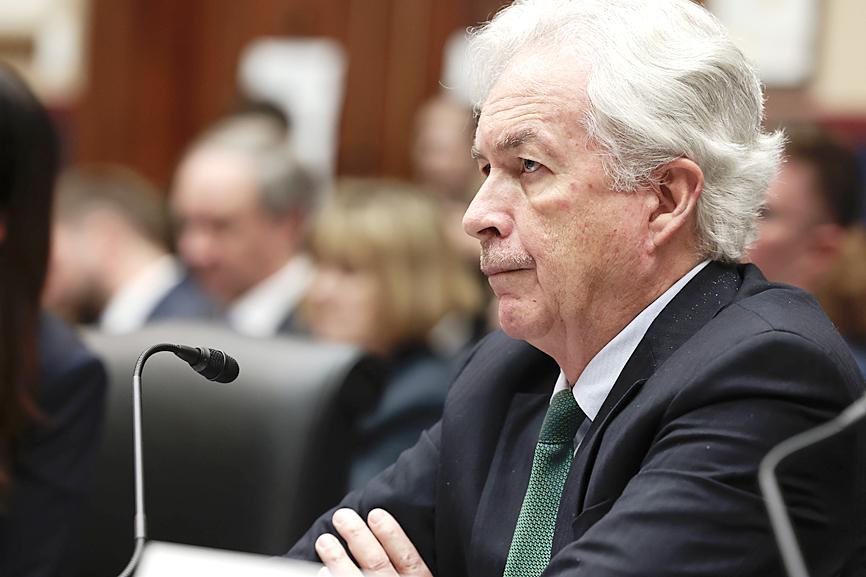CIA Director William Burns on Tuesday said that Russia’s military struggles in Ukraine and the force of Western sanctions had “unsettled” China, but warned that Washington should not underestimate Beijing’s determination to force unification with Taiwan.
Burns made the assessment at an annual US House of Representatives Permanent Select Committee on Intelligence hearing on worldwide threats, which was also attended by several other intelligence chiefs.
While “the partnership between Russia and China has strengthened since 2019, [Chinese] President Xi [Jinping, 習近平] and the Chinese leadership are a little bit unsettled by what they’re seeing in Ukraine,” Burns told the committee.

Photo: AFP
China did not anticipate the difficulties that the Russians were going to run into in Ukraine, and is concerned by the “reputational damage” coming from its close association with Russian President Vladimir Putin, Burns said.
Beijing is also worried about the conflict’s effects on the global economy, coming at a time when China’s annual growth has slowed, as well as the way it has driven Europeans and Americans closer together, he said.
Despite these concerns, “I would not underestimate President Xi and the Chinese leadership’s determination with regard to Taiwan,” although the conflict might change the “Chinese calculus” on the issue, Burns said.
US Director of National Intelligence Avril Haines said that the Western response, in terms of its unity and the impact of the sanctions, demonstrates to China “the seriousness with which we would approach an infringement on Taiwan.”
During the hearing, several lawmakers asked whether Russia’s invasion of Ukraine would embolden China to launch an attack on Taiwan, and what the US could do to prevent it.
US Defense Intelligence Agency Director Scott Berrier said he believed that Taiwan and Ukraine are “two different things completely,” not least because of the strength of the US “deterrence posture” in the Pacific.
Haines, whose agency publishes the US intelligence community’s annual threat assessment report, said that China remains an “unparalleled priority,” while Russia, Iran and North Korea also represent pressing threats to US national interests.
China, in particular, excels at “bringing together a coordinated, whole-of-government approach” to demonstrate its strength and pressure its neighbors into accepting its positions, including its claims of sovereignty over Taiwan, she said.
“China would prefer coerced unification that avoids armed conflict, and it has been stepping up diplomatic, economic and military pressure on [Taiwan] for years to isolate it and weaken its confidence in its democratically elected leaders,” Haines said.
“At the same time, Beijing is preparing to use military force if it decides this is necessary,” she added.

DAREDEVIL: Honnold said it had always been a dream of his to climb Taipei 101, while a Netflix producer said the skyscraper was ‘a real icon of this country’ US climber Alex Honnold yesterday took on Taiwan’s tallest building, becoming the first person to scale Taipei 101 without a rope, harness or safety net. Hundreds of spectators gathered at the base of the 101-story skyscraper to watch Honnold, 40, embark on his daredevil feat, which was also broadcast live on Netflix. Dressed in a red T-shirt and yellow custom-made climbing shoes, Honnold swiftly moved up the southeast face of the glass and steel building. At one point, he stepped onto a platform midway up to wave down at fans and onlookers who were taking photos. People watching from inside

A Vietnamese migrant worker yesterday won NT$12 million (US$379,627) on a Lunar New Year scratch card in Kaohsiung as part of Taiwan Lottery Co’s (台灣彩券) “NT$12 Million Grand Fortune” (1200萬大吉利) game. The man was the first top-prize winner of the new game launched on Jan. 6 to mark the Lunar New Year. Three Vietnamese migrant workers visited a Taiwan Lottery shop on Xinyue Street in Kaohsiung’s Gangshan District (崗山), a store representative said. The player bought multiple tickets and, after winning nothing, held the final lottery ticket in one hand and rubbed the store’s statue of the Maitreya Buddha’s belly with the other,

Japan’s strategic alliance with the US would collapse if Tokyo were to turn away from a conflict in Taiwan, Japanese Prime Minister Sanae Takaichi said yesterday, but distanced herself from previous comments that suggested a possible military response in such an event. Takaichi expressed her latest views on a nationally broadcast TV program late on Monday, where an opposition party leader criticized her for igniting tensions with China with the earlier remarks. Ties between Japan and China have sunk to the worst level in years after Takaichi said in November that a hypothetical Chinese attack on Taiwan could bring about a Japanese

‘COMMITTED TO DETERRENCE’: Washington would stand by its allies, but it can only help as much as countries help themselves, Raymond Greene said The US is committed to deterrence in the first island chain, but it should not bear the burden alone, as “freedom is not free,” American Institute in Taiwan Director Raymond Greene said in a speech at the Institute for National Defense and Security Research’s “Strengthening Resilience: Defense as the Engine of Development” seminar in Taipei yesterday. In the speech, titled “Investing Together and a Secure and Prosperous Future,” Greene highlighted the contributions of US President Donald Trump’s administration to Taiwan’s defense efforts, including the establishment of supply chains for drones and autonomous systems, offers of security assistance and the expansion of